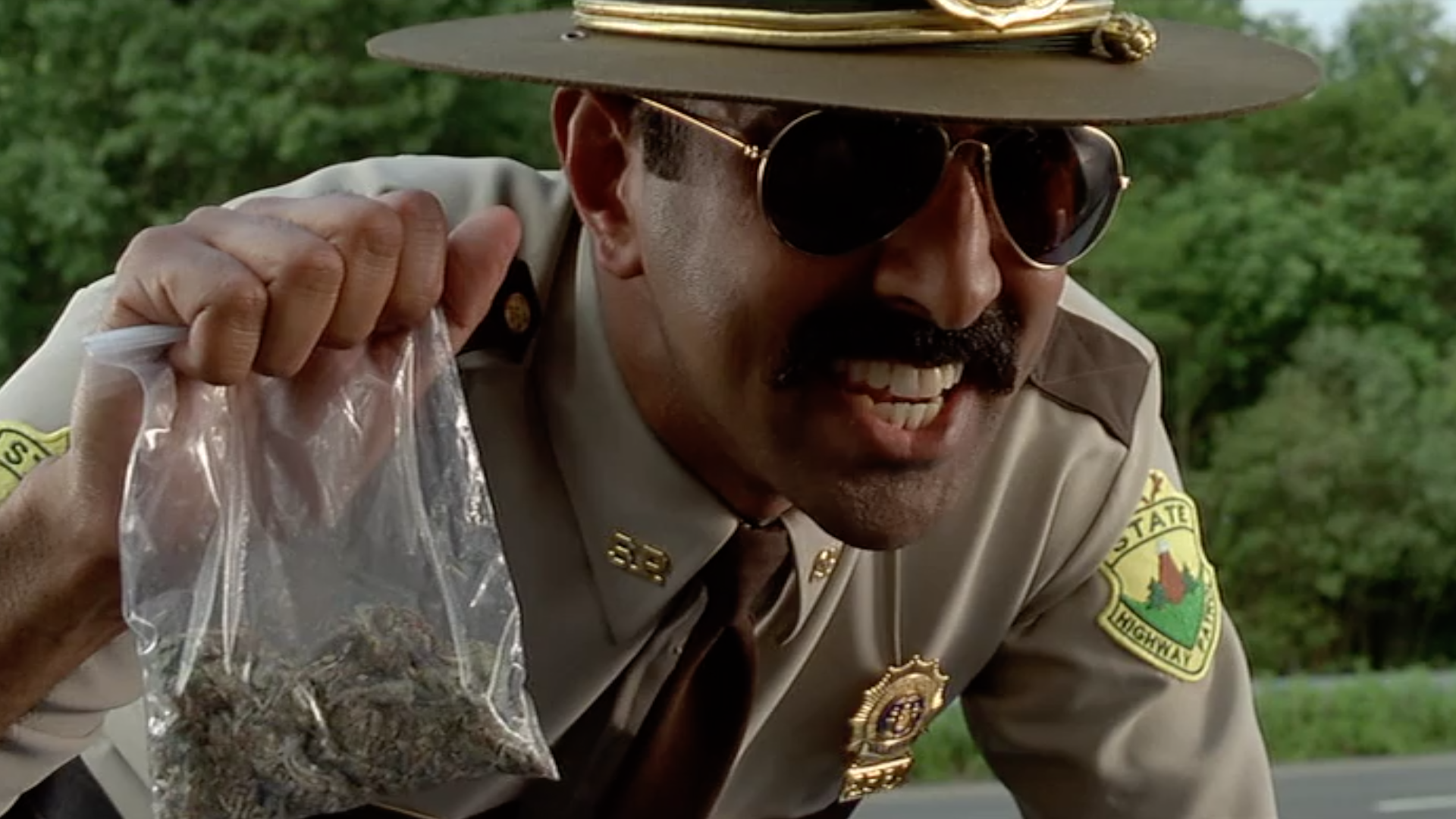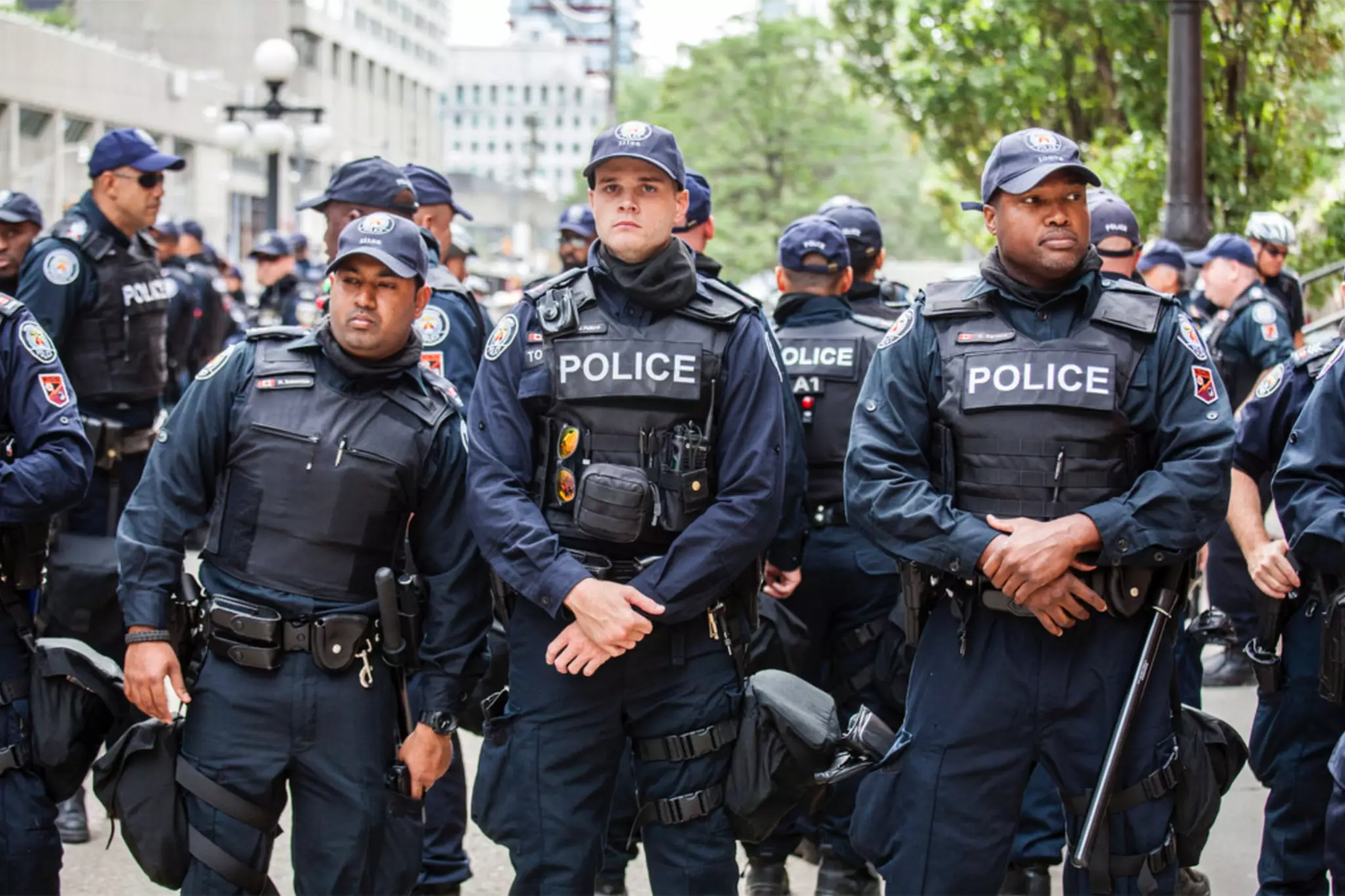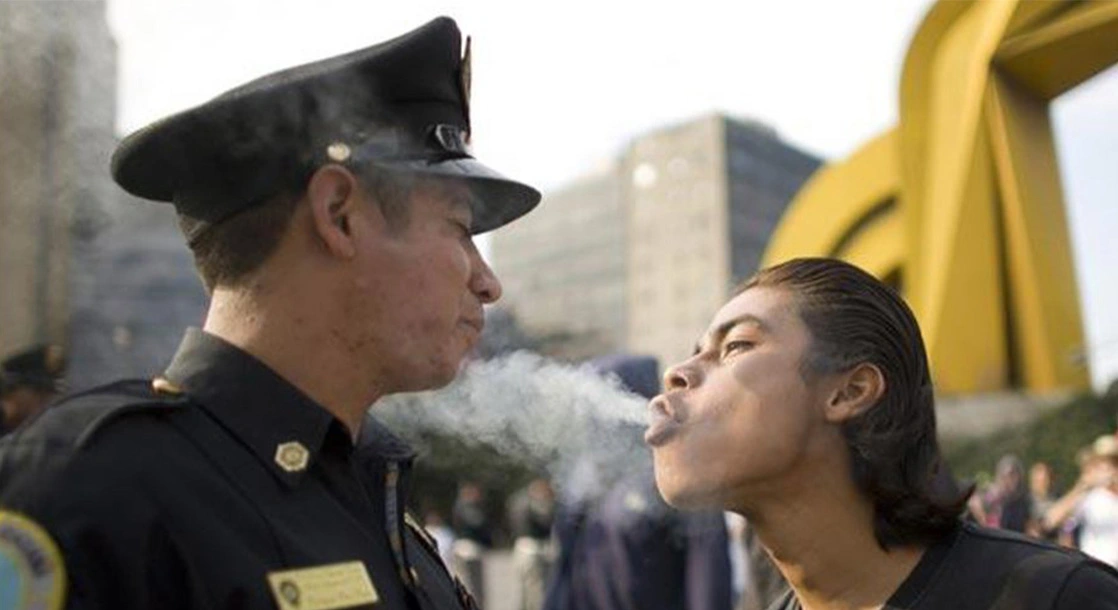
Canada made headlines around the world when it took a bold step towards cannabis legalization in October 2018. This marked a historic moment as the country became one of the first major nations to fully legalize the recreational use of cannabis. The Cannabis Act, which came into effect, laid down the groundwork for regulating the production, sale, possession, and consumption of cannabis products throughout the country. This monumental shift in policy prompted a myriad of questions and curiosities, including one that often sparks intense debate: Can cops, the enforcers of the law, smoke weed legally?
With the decriminalization of cannabis, a veil of curiosity was cast over whether police officers, tasked with upholding the law, were permitted to partake in its recreational use. This curiosity stems from the inherent contradictions between law enforcement responsibilities and personal freedoms. The image of a uniformed officer smoking a joint raises valid questions about the boundaries of legal cannabis use within the ranks of police departments.
The importance of understanding the laws surrounding cannabis use by law enforcement cannot be overstated. Clarity in this matter not only addresses the concerns of the public but also helps maintain the integrity and trustworthiness of police officers. It ensures that police personnel are aware of their rights and responsibilities when it comes to cannabis consumption, both on and off-duty. This article aims to shed light on the complex legal landscape, the evolving regulations, and the impact of cannabis use on the role of police officers in Canada.
The Legalization of Cannabis in Canada
In Canada, the legalization of cannabis for recreational use marked a significant shift in drug policy. This transformative change occurred on October 17, 2018, when the Cannabis Act, also known as Bill C-45, came into effect. Under this legislation, adults aged 18 and older were granted the right to purchase, possess, and consume cannabis for non-medical purposes. This groundbreaking move was aimed at regulating and controlling the production, distribution, and sale of cannabis, with the overarching goal of reducing the influence of the illegal market.
Key Provisions of the Cannabis Act
The Cannabis Act introduced a comprehensive framework that outlined the rules and regulations governing cannabis in Canada. Some of the key provisions of this legislation include strict regulations on the packaging and labeling of cannabis products to ensure safety and consumer information. It established limits on the possession of cannabis, allowing adults to possess up to 30 grams of dried cannabis in public. Additionally, the Act provided guidelines for the cultivation of cannabis plants for personal use, allowing individuals to grow up to four plants per household.
It’s crucial to understand that while the Cannabis Act set the overarching framework for cannabis legalization, the implementation and finer details of regulations were left to the provinces and territories. This division led to some variations in rules across different regions of Canada. Provincial governments were given the authority to determine the legal age for cannabis consumption, set regulations for distribution and retail, and even enact stricter rules if deemed necessary. As a result, cannabis regulations could vary significantly from one province to another, emphasizing the importance of understanding both federal and provincial laws when it comes to cannabis use in Canada. This division between federal and provincial regulations added complexity to the legal landscape, creating a unique challenge for law enforcement officers tasked with upholding these varying sets of rules.
Cannabis Use Laws for Police Officers

The legal framework surrounding cannabis use by law enforcement in Canada is indeed a multifaceted and intricate system. While the Cannabis Act represented a significant shift in the legal status of cannabis, it did not create a blanket exemption for police officers to engage in recreational cannabis use. Instead, police departments across Canada have taken on the responsibility of developing their own specific guidelines and policies to address the issue within the context of law enforcement.
These departmental policies are rooted in a few fundamental principles:
- Professionalism: Police officers are held to a high standard of professionalism both on and off duty. Maintaining the public’s trust and confidence in law enforcement is of paramount importance. As such, these policies often stress that officers should conduct themselves in a manner that upholds the integrity of the profession and reflects positively on their respective police departments.
- Adherence to Laws and Regulations: Police officers are expected to be law-abiding citizens at all times. This includes compliance with all relevant federal, provincial, and municipal laws and regulations. Since cannabis remains a regulated substance, officers are generally required to follow the same rules as the general public when it comes to cannabis possession and use.
- Impairment and Duty: A key focus of these policies is to address the potential impact of cannabis use on an officer’s ability to perform their duties effectively and safely. Many police departments have strict regulations regarding the use of cannabis in the hours leading up to a shift, as the impairment caused by cannabis can compromise an officer’s judgment, motor skills, and overall fitness for duty.
- Public Perception: The image of a police officer consuming cannabis, even during their off-duty hours, can be a sensitive issue. These policies consider the potential impact on public perception and trust. Officers are often encouraged to be mindful of the potential consequences of their actions on the public’s perception of the police force as a whole.
- Educational and Support Resources: Some police departments may provide educational resources and support for officers to help them understand their rights and responsibilities regarding cannabis use. This can include information on legal limits, testing procedures, and avenues for seeking assistance if they encounter challenges related to cannabis use.
In summary, while the Cannabis Act decriminalized cannabis for recreational use among adults in Canada, it introduced complexities and challenges for police officers. To navigate this complex legal landscape, police departments have implemented their own internal policies and guidelines. These policies are designed to strike a balance between respecting officers’ personal freedoms and ensuring they maintain the professionalism and public trust essential to their roles in law enforcement. Adherence to these policies is crucial, as violations can lead to disciplinary actions that range from reprimands to, in more severe cases, termination of employment. As cannabis laws continue to evolve, police departments and officers must remain vigilant and informed about the legal and ethical considerations surrounding cannabis use within law enforcement.
Clarifying the Rules: Can Cops Smoke Weed Off-Duty?
The question of whether police officers can smoke weed off-duty has indeed sparked extensive debate and scrutiny within the context of changing cannabis laws and evolving societal attitudes. It’s a complex issue that hinges on the balance between the personal rights and freedoms of officers as private citizens and the responsibilities and expectations inherent to their profession.
It is crucial to acknowledge that off-duty police officers have the same personal rights and freedoms as any other individual in society. In Canada, the legalization of recreational cannabis use for adults recognized that individuals have the legal right to use cannabis within specified limits. This recognition of personal freedom is a cornerstone of democratic societies.
However, the situation becomes significantly more intricate when considering the unique role and obligations of police officers. Law enforcement agencies across the country have taken steps to address this complexity by implementing their own internal policies and guidelines regarding off-duty cannabis use.
the Impact of Cannabis Use on Police Duties and Responsibilities
The impact of cannabis use on police duties and responsibilities is a multifaceted and critical consideration for law enforcement agencies. Cannabis, like any psychoactive substance, has the potential to impair cognitive and motor skills, which are essential for police officers to perform their duties effectively and safely. This impairment can manifest in various ways, including slowed reaction times, diminished judgment, impaired decision-making, and reduced motor coordination.
To address these potential impairments, many police departments in Canada have implemented stringent rules and policies regarding cannabis use, particularly in the hours leading up to a shift. These policies are designed to ensure that officers reporting for duty are not under the influence of cannabis, thereby minimizing the risk of impaired performance and promoting public safety. These regulations often specify a specific “clearance period” during which officers must refrain from using cannabis before reporting for work.
Furthermore, the public perception of law enforcement officers using cannabis can indeed be a contentious issue. Police officers are often seen as role models and figures of authority within their communities. The image of an officer using cannabis, even during their off-duty hours, can challenge the traditional perception of law enforcement and raise questions about the professionalism and credibility of the entire police force.
Maintaining public trust and confidence in law enforcement is of paramount importance. When public perception is negatively influenced, it can erode the public’s willingness to cooperate with the police, report crimes, and support law enforcement efforts. As such, police departments must carefully consider the potential impact of officers’ off-duty activities on public perception and work to strike a balance between respecting officers’ personal rights and ensuring they remain fit for duty.
This balance is crucial not only for the officers themselves but also for the communities they serve. It is in the best interests of both law enforcement agencies and the public to have officers who are physically, mentally, and ethically prepared to perform their duties effectively. Achieving this balance requires ongoing education, training, and a commitment to upholding the highest standards of professionalism, ethics, and accountability within law enforcement. It also underscores the need for transparent and clear policies that address the complexities of cannabis use within the context of law enforcement, allowing officers to navigate this evolving landscape while maintaining the trust and confidence of their communities.
How Police Departments Are Addressing Cannabis USE

Police departments across Canada have indeed acknowledged the importance of addressing cannabis use among their officers in a responsible and proactive manner. This recognition stems from the need to navigate the complexities of evolving cannabis legislation while upholding the highest standards of professionalism and public trust. The approach to addressing this issue typically involves several key components:
- Comprehensive Education and Training Programs: Police departments prioritize the education and training of their officers regarding the legal and ethical aspects of cannabis use within their respective jurisdictions. These programs are designed to ensure that officers have a clear understanding of the laws and regulations surrounding cannabis, as well as the potential implications of cannabis use on their personal and professional lives. Education empowers officers to make informed decisions and minimizes the risk of unintentional violations.
- Open Dialogue: Maintaining open lines of communication with officers is crucial. Police departments engage in ongoing dialogues with their personnel to facilitate discussions about the expectations and limitations related to cannabis consumption. These dialogues aim to create a culture of transparency and ensure that officers are aware of the department’s stance on cannabis use. It also provides an opportunity for officers to seek clarification on any related issues.
- Setting Clear Expectations: Police departments establish and communicate clear expectations regarding cannabis use. They often emphasize that officers are held to a high standard of professionalism, both on and off-duty, and are expected to abide by the laws and regulations governing cannabis. This includes adherence to departmental policies, which may include prohibitions on cannabis use within a specified timeframe before duty.
- Support and Resources: Some police forces go a step further by offering support and resources for officers who may require assistance in managing their cannabis use. This is particularly important if an officer’s cannabis use becomes problematic or if they are struggling with related issues such as addiction or mental health concerns. Providing access to confidential support services can help officers address these challenges in a constructive and supportive environment.
The proactive approach taken by police departments demonstrates a commitment to navigating the complexities of cannabis use within law enforcement responsibly. It recognizes that officers, like any individuals, may encounter situations where they need guidance or support related to cannabis use. By offering comprehensive education, fostering open dialogue, and providing resources for those in need, police departments aim to strike a balance between respecting individual rights and ensuring officers are fit for duty, all while maintaining the trust and confidence of the communities they serve.
Internal Policies and Guidelines on Cannabis Consumption
To maintain transparency and consistency, police departments establish internal policies and guidelines that explicitly address cannabis consumption by their officers. These policies typically outline the expectations and restrictions placed on officers with regards to cannabis use, especially in the lead-up to their shifts. It is common to find policies that require officers to refrain from cannabis use within a certain timeframe before duty to ensure they are not impaired while performing their responsibilities. These guidelines aim to strike a balance between respecting officers’ rights and ensuring the safety and professionalism of law enforcement personnel.
Consequences for Officers Who Violate Cannabis Use Regulations
The consequences for officers who violate cannabis use regulations can vary depending on the specific policies of their respective police departments. In many cases, violating these regulations can lead to disciplinary actions, ranging from reprimands and suspensions to, in extreme cases, termination. The severity of the consequences often hinges on factors such as the frequency of violations, the officer’s role within the department, and the impact of the violation on their ability to perform their duties. It is important to note that these consequences are not intended to be punitive but rather serve as a means to maintain the integrity, professionalism, and public trust associated with law enforcement officers.
Public Perception and Challenges

Public perception of police officers smoking weed is a complex and often polarized issue. On one hand, some members of the public argue that officers should be allowed the same personal freedoms as any other citizen, as long as they are not impaired while on duty. They believe that an officer’s off-duty activities should be their own business. On the other hand, there are concerns about the message it sends to the public and the potential impact on an officer’s credibility and trustworthiness. The image of an officer consuming cannabis can challenge the traditional perception of law enforcement as role models for society. Therefore, understanding and addressing these varying perceptions is crucial in shaping public discourse and policy.
Enforcing and Regulating Cannabis Use Among Police Officers
Enforcing and regulating cannabis use among police officers presents unique challenges. One of the primary difficulties is determining when an officer has consumed cannabis and whether they are impaired while on duty. Unlike alcohol, cannabis intoxication is not as easily detectable through traditional means like breathalyzer tests. This makes it challenging to strike a balance between personal privacy and public safety. Police departments face the dilemma of establishing clear policies and testing procedures that can accurately identify impairment without infringing on officers’ rights. Additionally, addressing and enforcing these regulations require a delicate approach to maintain morale and professionalism within law enforcement agencies.
Balancing Individual Rights with Public Trust and Safety
The crux of the issue lies in finding the right balance between individual rights and public trust and safety. While officers have personal rights as citizens, they also hold a position of authority and public responsibility. Balancing these aspects requires thoughtful policy development that respects personal freedoms while upholding the principles of law enforcement. It is essential to maintain public trust in the police force by ensuring that officers are fit for duty at all times and that their actions align with the values of integrity, transparency, and professionalism. Striking this balance is an ongoing challenge that evolves as societal attitudes towards cannabis continue to change and as legal and regulatory frameworks adapt to reflect these shifts.
Conclusion
In summary, the question of whether police officers can smoke weed in Canada is a multifaceted issue governed by a complex set of laws, regulations, and ethical considerations. While the Cannabis Act legalized recreational cannabis use for adults, police departments have established their own guidelines. These guidelines often prohibit cannabis use within a specific timeframe before duty to ensure officers remain fit for their responsibilities.
It is paramount for both law enforcement officers and the public to stay informed about the evolving regulations surrounding cannabis in Canada. The legal landscape is dynamic, and changes in legislation or departmental policies can significantly impact the rights and responsibilities of officers. Keeping up-to-date with these changes is essential to avoid inadvertent violations and to maintain public trust in law enforcement.
Lastly, fostering open dialogue and promoting responsible cannabis use within law enforcement is crucial. Police departments must provide education and resources to ensure that officers are well-informed about their rights and obligations. Encouraging responsible use helps officers strike a balance between their personal freedoms and their professional responsibilities. It is essential that both officers and their departments continue to navigate this complex issue with integrity, professionalism, and a commitment to upholding public trust and safety. Ultimately, by addressing these challenges thoughtfully and proactively, law enforcement can navigate the changing landscape of cannabis use while maintaining the highest standards of service and accountability.



